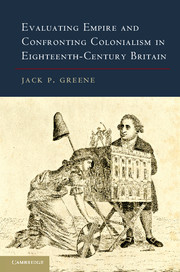Book contents
- Frontmatter
- Contents
- Preface Confronting Empire
- Prologue “Scene of a Foul Transaction”
- 1 “The Principal Cornucopia of Great-Britain's Wealth”
- 2 Outposts of “Loose Vagrant People”
- 3 “A Fabric at Once the Dread and Wonder of the World”
- 4 Arenas of “Asiatic Plunder”
- 5 Sites of Creolean Despotism
- 6 “A Fruitless, Bloody, Wasting War”
- 7 “This Voraginous Gulph of Hibernian Dependence”
- 8 A “Shadow of Our Former Glory”?
- Epilogue “Against Every Principle of Justice, Humanity, and Whatever is Allowed to be Right Among Mankind”
- Index
- References
6 - “A Fruitless, Bloody, Wasting War”
The Languages of Imperial Grandeur, Liberty, Humanity, and Commerce in the American Conflict
Published online by Cambridge University Press: 05 June 2013
- Frontmatter
- Contents
- Preface Confronting Empire
- Prologue “Scene of a Foul Transaction”
- 1 “The Principal Cornucopia of Great-Britain's Wealth”
- 2 Outposts of “Loose Vagrant People”
- 3 “A Fabric at Once the Dread and Wonder of the World”
- 4 Arenas of “Asiatic Plunder”
- 5 Sites of Creolean Despotism
- 6 “A Fruitless, Bloody, Wasting War”
- 7 “This Voraginous Gulph of Hibernian Dependence”
- 8 A “Shadow of Our Former Glory”?
- Epilogue “Against Every Principle of Justice, Humanity, and Whatever is Allowed to be Right Among Mankind”
- Index
- References
Summary
At the very same time that Britons were coming to realize that their view of themselves as a great commercial, powerful, and humane nation was in conflict with the behavior exhibited by East India Company employees, American slaveholders, and traders in African slaves, they were also confronted with the problem of retaining the revolting colonies in North America. Having committed the nation to a policy of military and naval coercion, the Administration soon discovered that this objective was far more elusive than it had expected. Rarely did military operations in America go well for more than a few months at a time, the army never managing to deal rebel military units a knockout blow. As the war dragged on, as a series of Government concessions turned out always to be too little, too late, as larger and larger metropolitan armies failed to pacify, much less to control, the countryside or destroy the American military, as France recognized diplomatically and came to the aid of the new United States, as critical defeats cost the British two armies, and as the mounting costs of the war placed British taxpayers under incredible financial burdens, the Administration found itself under sharp attack from the Opposition, which reiterated and expanded upon old questions about the decision to use force against the colonies and the feasibility of that strategy as a means for retaining an association with those colonies and raised new questions about the conduct of the war. The debate over these questions renewed and intensified the pre-war discussion over how – or even whether – the language of imperial grandeur might be reconciled with the languages of liberty, commerce, and humanity in the management of such “a wide extent of empire” as that of the British.
- Type
- Chapter
- Information
- Publisher: Cambridge University PressPrint publication year: 2013



